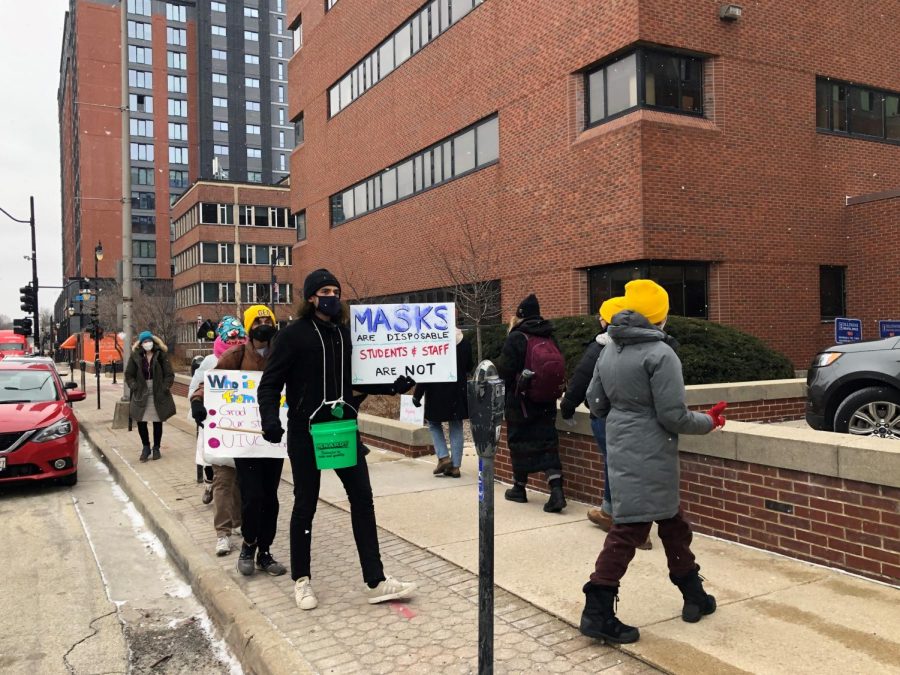GEO continues negotiations with University over COVID-19 guidelines
Members of GEO protest against lifted mask mandate in front of the Swuanland Administration Building on Feb. 23. Since them GEO has been fighting with the University in regards to Covid-19 safety.
Mar 4, 2022
Over the past few weeks, the Graduate Employees’ Organization has been protesting against the University’s updated COVID-19 guidelines as well as graduate student treatment.
During the beginning of the semester, all students living in residence housing received a free N95 mask that was reusable for a few days. The GEO began a petition on Jan. 17 to drive the University to hand out more masks to students.
“The petition received over 1,400 signatures from graduate workers, students, faculty and community members in support of several demands,” said Chelsea Birchmier, doctoral student in LAS and the Solidarity Committee co-chair of the GEO. “One of those demands was 16 N95 or KN95 masks, which were the bare minimum we were asking for.”
The GEO wanted students and workers to be given at least 16 masks in order to reuse them throughout the semester. Birchmier said they soon realized that the masks weren’t very high quality, and it was even more necessary to have enough masks for the semester. Starting Feb. 10, the University gave out 10 additional masks to all students and workers.
“We have been engaged with the GEO around their list of demands for a number of weeks, including providing them a formal written response when we first received it,” said Robin Kaler, associate chancellor for Public Affairs, in an email. “These issues have been discussed multiple times in the ongoing impact bargaining meetings between the GEO and the University Labor Relations team.”
Get The Daily Illini in your inbox!
Another priority the GEO is currently trying to address is the teaching modality for graduate students. The GEO temporarily stopped their movement to transition classes online due backlash from the University in addition to the severe winter storm that started on Feb. 1.
“There is this continuous double standard from the University,” said Karla Sanabria-Veaz, graduate student in LAS and the officer-at-large of the GEO. “As we have seen from the winter snowstorm, the University can decide to change the modality of our labor unilaterally without even negotiating with us.”
Veaz said the University’s double standards are always in the best interest of faculty and not graduate students. If the University can enforce e-learning during the winter snowstorm, they can do it a bit longer for the current deadly pandemic too, Veaz said.
Kaler said graduate instructors can teach remotely if they are unable to teach a class or two in person because of COVID-19 reasons. A shift in the modality for the entire semester depends on the approval of the unit executive officer for that department and the dean.
“The University says there is a verified absence system when a student tests positive from COVID,” Veaz said. “They say this system is to protect, through FERPA and HIPAA laws, the personal medical information of the student.”
According to Veaz, many graduate students have had students message them regarding their positive COVID-19 test. Veaz herself received such an email before Labor Day weekend and was unable to tell her entire class they were potentially exposed to COVID-19 due to University rules. In addition, Veaz never received the verified absence from the student who tested positive.
Such rules put the lives of graduate students at risk, Birchmier said. Veaz said current attempts at negotiating with the University were not met with good faith. The University sent out a Massmail about COVID-19 guidance during the middle of live negotiations with the GEO, which Vaez said was highly disrespectful.
“We will continue to organize and fight until our demands are heard and adopted by the University,” Veaz said.






